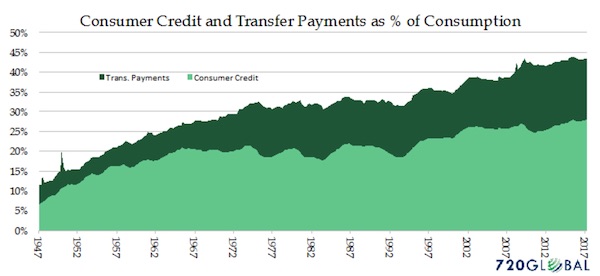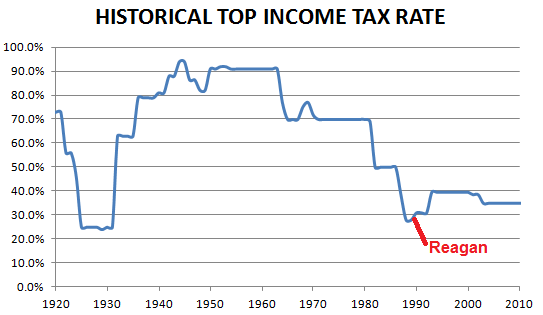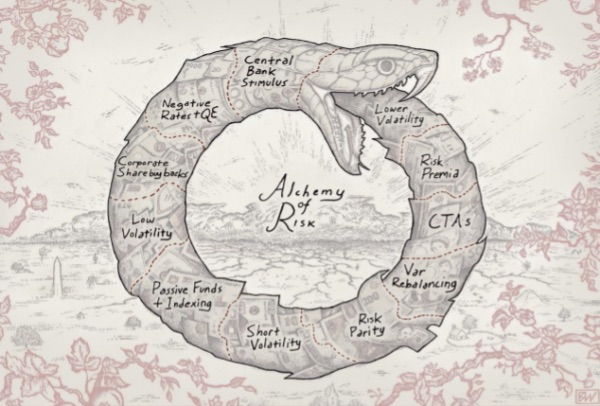
Alfred Wertheimer Elvis 1956
New Zealand’s new prime minister Jacinda Ardern calls capitalism a blatant failure. Former Greek finance minister Yanis Varoufakis says capitalism is ‘merely’ coming to an end because it is making itself obsolete. Mathematics professor Bruce Boghosian claims that without redistribution of wealth, our market economy would not be stable, because wealth always tends to concentrate. The people at Artemis Capital Management write that the stock market has begun self-cannibalizing like a snake eating its tail, and the only reason we’re not in a recession already is ‘financial alchemy’.
At the very least we can say that the system is under pressure. But what system is that? It would be nice to have a clearcut definition of capitalism, but alas, there are many, about as many as there are different forms of it. That doesn’t make this any easier. Americans call many European economies ‘socialist’, which seems to mean they are not capitalist. But Scandinavian countries don’t function like the Soviet Union either.
And if you see how much money is involved in transfer payments to citizens in the US, the supposed bastion of free market capitalism, it’s tempting to conclude the system has already failed. But even with transfer payments, inequality is at record levels. That would seem to confirm Boghosian’s statement that “even if a society does redistribute wealth, if it’s too small an amount, “a partial oligarchy will result..” So what then?

Varoufakis and others want a “universal basic dividend”, or “universal basic income”. Would that be the end of capitalism as we know it? Or is it just a -perhaps more extreme- form of ‘state capitalism’? Varoufakis deems it inevitable because technology will eradicate so many jobs from societies that people won’t be able to make money from work. Personally, I’ve long thought that the pending large-scale demise of pensions systems will lead to some form of UBI.
37-year-young Jacinda Ardern is very clear in her assessment of New Zealand’s form of capitalism. If you’ve got the worst homelessness in the developed world, you have a broken system. If the system fails the people, it’s no good. Other people might argue that capitalism never promised to take care of everyone. Or rather, not through state interference. Labour’s Ardern has her view:
New Zealand’s New Prime Minister Brands Capitalism A ‘Blatant Failure’
[Jacinda] Ardern, has pledged her government will increase the minimum wage, write child poverty reduction targets into law, and build thousands of affordable homes. In her first full interview since becoming prime minister-elect, she told current affairs programme The Nation that capitalism had “failed our people”. “If you have hundreds of thousands of children living in homes without enough to survive, that’s a blatant failure,” she said. [..] “When you have a market economy, it all comes down to whether or not you acknowledge where the market has failed and where intervention is required. Has it failed our people in recent times? Yes. How can you claim you’ve been successful when you have growth roughly 3%, but you’ve got the worst homelessness in the developed world?”
So to which extent should a state interfere in markets, and in society at large? There are obviously wide ideological divides when it comes to answering that one. Does that mean there is no answer possible at all? Perhaps not. Perhaps the answer lies in the fact that the system is predestined to fail, as Boghosian’s mathematical models suggest: “Our work refutes the idea that free markets, by virtually leaving people up to their own devices, will be fair..”
That doesn’t necessarily demand a lot of interference, we could ‘simply’ write the rules of the game in such a way that the ‘natural tendency’ towards wealth concentration is blocked. An example is the history of the top US income tax rate. Arguably, the nation was doing a lot better under Eisenhower and Kennedy, with a top rate of 91%, than it is today. If you put a few rules like that in play, perhaps including Varoufakis’ idea of a ‘common welfare fund’, maybe the state doesn’t have to interfere much otherwise.

One of the main underlying claims of capitalism, and of macroeconomics in general, is that markets -and societies- will sort themselves out if left alone. Bruce Boghosian says this is not true, and that he has the math to prove it. The entire notion of markets tending towards a ‘supply-demand equilibrium’ is nonsense, he says (echoing Minsky, Steve Keen et al). Trickle-down economics is a figment of the imagination, while trickle up-economics flourishes.
This refutes much of what our economic systems are based on, which would appear to indicate that we need an urgent revision of these systems. Unless we would agree that Darwin-on-Steroids is a good idea. We don’t and won’t, because it would mean Stephen Foster’s “frail forms fainting at the door” all over the place. A market ideology that causes widespread misery has no future.
Seven years ago, the combined wealth of 388 billionaires equaled that of the poorest half of humanity , according to Oxfam International. This past January the equation was even more unbalanced: it took only eight billionaires, marking an unmistakable march toward increased concentration of wealth. Today that number has been reduced to five billionaires.
Trying to understand such growing inequality is usually the purview of economists, but Bruce Boghosian, a professor of mathematics, thinks he has found another explanation—and a warning. Using a mathematical model devised to mimic a simplified version of the free market, he and colleagues are finding that, without redistribution, wealth becomes increasingly more concentrated, and inequality grows until almost all assets are held by an extremely small percent of people.
“Our work refutes the idea that free markets, by virtually leaving people up to their own devices, will be fair,” he said. “Our model, which is able to explain the form of the actual wealth distribution with remarkable accuracy, also shows that free markets cannot be stable without redistribution mechanisms. The reality is precisely the opposite of what so-called ‘market fundamentalists’ would have us believe.”
While economists use math for their models, they seek to show that an economy governed by supply and demand will result in a steady state or equilibrium, while Boghosian’s efforts “don’t try to engineer a supply-demand equilibrium, and we don’t find one,” he said. [..] The model tracks the data with remarkable accuracy, he said. He and his team will soon publish a paper on how it relates to U.S. wealth data from 1989 to 2013.
“We have also begun to apply it to wealth data from the ECB, and so far it seems to work very well for certain European countries as well,” he said [..] It turns out that when agents do well in early transactions, the odds are so increasingly stacked in their favor that—without redistribution from taxes or other wealth-transfer mechanisms—they will get more money, and keep accruing wealth inevitably.
“Without redistribution of wealth, our market economy would not be stable,” said Boghosian. “One person would run away with all the wealth, and it would keep going until it came to complete oligarchy.” And even if a society does redistribute wealth, if it’s too small an amount, “a partial oligarchy will result,” Boghosian said.
If markets and societies cannot survive under current rules, theories and ideologies, what do we do? The Artemis guys strongly suggest we stop the practice of excessive stock buybacks- even if they’re the only thing propping up the whole market system. Because they’re leading us straight into a recession. Because they’re making that recession a lot worse.
Volatility and the Alchemy of Risk
The Ouroboros, a Greek word meaning ‘tail devourer’, is the ancient symbol of a snake consuming its own body in perfect symmetry. The imagery of the Ouroboros evokes the infinite nature of creation from destruction. The sign appears across cultures and is an important icon in the esoteric tradition of Alchemy. Egyptian mystics first derived the symbol from a real phenomenon in nature. In extreme heat a snake, unable to self-regulate its body temperature,will experience an out-of-control spike in its metabolism. In a state of mania, the snake is unable to differentiate its own tail from its prey,and will attack itself, self-cannibalizing until it perishes. In nature and markets, when randomness self-organizes into too perfect symmetry, order becomes the source of chaos.
The Ouroboros is a metaphor for the financial alchemy driving the modern Bear Market in Fear. Volatility across asset classes is at multi-generational lows. A dangerous feedback loop now exists between ultra-low interest rates, debt expansion, asset volatility, and financial engineering that allocates risk based on that volatility. In this self-reflexive loop volatility can reinforce itself both lower and higher. In a market where stocks and bonds are both overvalued, financial alchemy is the only way to feed our global hunger for yield, until it kills the very system it is nourishing.

[..] At the head of the Great Snake of Risk is unprecedented monetary policy. Since 2009 Global Central Banks have pumped in $15 trillion in stimulus creating an imbalance in the investment demand for and supply of quality assets. Long term government bond yields are now the lowest levels in the history of human civilization dating back to 1285. As of this summer there was $9.5 trillion worth of negative yielding debt globally. Last month Austria issued a 100-year bond with a coupon of only 2.1%(6) that will lose close to half its value if interest rates rise 1% or more. The global demand for yield is now unmatched in human history. None of this makes sense outside a framework of financial repression.
Amid this mania for investment, the stock market has begun self-cannibalizing… literally. Since 2009, US companies have spent a record $3.8 trillion on share buy-backs financed by historic levels of debt issuance. Share buybacks are a form of financial alchemy that uses balance sheet leverage to reduce liquidity generating the illusion of growth. A shocking +40% of the earning-per-share growth and +30% of the stock market gains since 2009 are from share buy-backs. Absent this financial engineering we would already be in an earnings recession.
Any strategy that systematically buys declines in markets is mathematically shorting volatility. To this effect, the trillions of dollars spent on share buybacks are equivalent to a giant short volatility position that enhances mean reversion. Every decline in markets is aggressively bought by the market itself, further lowing volatility. Stock price valuations are now at levels which in the past have preceded depressions including 1928, 1999, and 2007. The role of active investors is to find value, but when all asset classes are overvalued, the only way to survive is by using financial engineering to short volatility in some form.
Yanis Varoufakis doesn’t so much argue that capitalism has already failed, he says it is bound to fail in the near future. Because new technology, including artificial intelligence, will destroy too many jobs for society to continue to function intact. That is already happening, in that we both produce and consume Google’s ‘products’, but we get none of the profits. An example:
Google’s Plan To Revolutionise Cities Is A Takeover In All But Name
Alphabet’s weapons are impressive. Cheap, modular buildings to be assembled quickly; sensors monitoring air quality and building conditions; adaptive traffic lights prioritising pedestrians and cyclists; parking systems directing cars to available slots. Not to mention delivery robots, advanced energy grids, automated waste sorting, and, of course, ubiquitous self-driving cars. Alphabet essentially wants to be the default platform for other municipal services. Cities, it says, have always been platforms; now they are simply going digital.
“The world’s great cities are all hubs of growth and innovation because they leveraged platforms put in place by visionary leaders,” states the proposal. “Rome had aqueducts, London the Underground, Manhattan the street grid.” Toronto, led by its own visionary leaders, will have Alphabet. Amid all this platformaphoria, one could easily forget that the street grid is not typically the property of a private entity, capable of excluding some and indulging others. Would we want Trump Inc to own it? Probably not. So why hurry to give its digital equivalent to Alphabet?
Google aims at taking over our entire communities, and claims this will be to our benefit. We let the new technology companies expand far and wide, to a large extent because our ‘leaders’ don’t understand what is happening any better than we do. But that is not a good thing, for many different reasons. It’ll be very hard to whistle them back later, both because of the wealth they’re building, and because of the intensifying links they have to government, including -or especially- the intelligence community.
Capitalism Is Ending Because It Has Made Itself Obsolete
Former Greek finance minister Yanis Varoufakis has claimed capitalism is coming to an end because it is making itself obsolete. The former economics professor told an audience at University College London that the rise of giant technology corporations and artificial intelligence will cause the current economic system to undermine itself.
Mr Varoufakis [..] said companies such as Google and Facebook, for the first time ever, are having their capital bought and produced by consumers. “Firstly the technologies were funded by some government grant; secondly every time you search for something on Google, you contribute to Google’s capital,” he said. “And who gets the returns from capital? Google, not you. “So now there is no doubt capital is being socially produced, and the returns are being privatised. This with artificial intelligence is going to be the end of capitalism.”
Warning Karl Marx “will have his revenge ”, the 56-year-old said for the first time since capitalism started, new technology “is going to destroy a lot more jobs than it creates”. He added: “Capitalism is going to undermine capitalism , because they are producing all these technologies that will make corporations and the private means of production obsolete. “And then what happens? I have no idea.”
Describing the present economic situation as “unsustainable” and fearing the rise of “toxic nationalism”, Mr Varoufakis said governments needed to prepare for post-capitalism by introducing redistributive wealth policies. He suggested one effective policy would be for 10% of all future issue of shares to be put into a “common welfare fund” owned by the people. Out of this a “universal basic dividend” could be paid to every citizen.
Has capitalism failed already, as Jacinda Ardern claims, or will that happen only in the future, as Varoufakis says? It may be a moot question once the system and the markets start collapsing. That they will, and must, is not a question but a certainty, even a mathematical one. Whatever your ideology, that is not a good thing. And the current ideology has caused this, that much is clear.
If the remaining wealth is not divided better than it is today, those who have gathered most of it will also find themselves in non-functioning societies and communities. Unless perhaps you’re George W. and have property in Paraguay.
But even then. We’re eating our tails.








